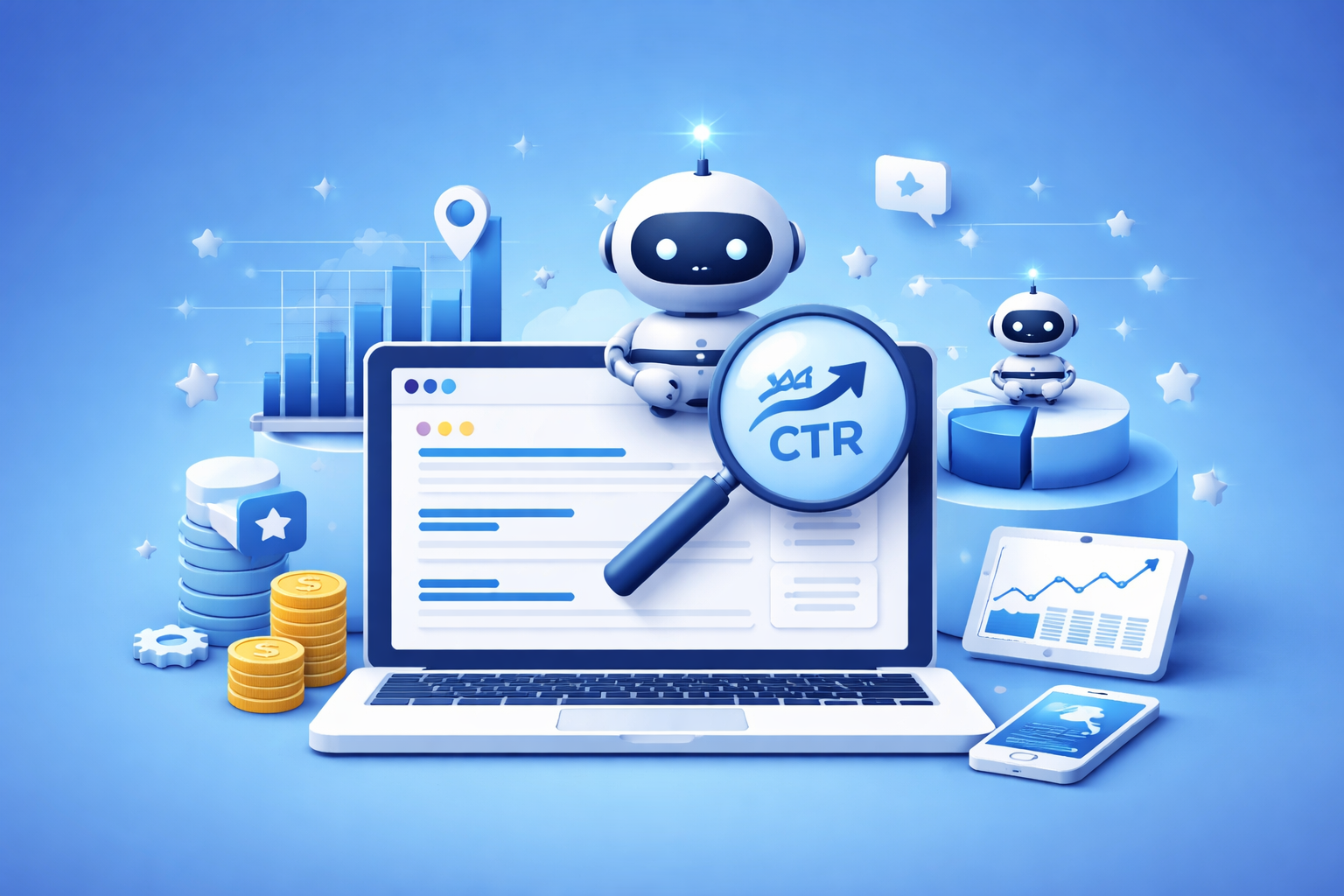When someone searches “best tacos near me” or “Italian restaurant downtown,” Google Maps isn’t just showing directions; it’s deciding where hungry customers go. Over 80% of restaurant searches happen on mobile, and most end in a nearby visit within hours.
Your position on Google Maps can decide whether your tables stay full or empty. If your restaurant ranks in the top three local pack results, you capture the majority of clicks, calls, and walk-ins.

How diners choose restaurants via Google Maps
Diners trust Google Maps. They look at star ratings, photos, menus, and distance, but most importantly, they click the listings that appear first. Eye-tracking studies show users rarely scroll beyond the top three map results, which means your click-through rate (CTR) directly impacts your visibility.
What influences local map rankings
Google uses three main ranking signals for Maps:
- Proximity: How close your business is to the searcher
- Relevance: How well your profile matches the query
- Prominence: How popular and engaged your business appears online
CTR affects that third signal, prominence. And that’s where CTR manipulation comes in.
What is CTR manipulation
Definition of Click-Through Rate in local SEO
CTR, or click-through rate, measures how often people click your listing when they see it in search or on Maps. In simple terms:
More clicks tell Google your listing is more relevant, which can improve your ranking.
How CTR affects Google’s local ranking algorithm
Google’s local ranking algorithm rewards engagement. If people consistently click your listing over competitors, even when you rank lower, Google interprets it as a sign that your business better satisfies search intent. Over time, this signal can help lift your ranking.
This effect is even more pronounced for Google My Business listings and Maps, where engagement metrics like direction requests, calls, and website clicks are highly influential.
Myths vs facts about CTR manipulation
Myth: CTR manipulation always gets you penalized.
Fact: Artificial spammy traffic can, but authentic-looking engagement signals are safe when done gradually and supported by quality content and reviews.
CTR manipulation for restaurant businesses: What works
Real-world examples of restaurants improving rankings with CTR strategies
Restaurants that consistently receive high click activity through ads, social, and brand awareness tend to climb in local pack rankings. Some SearchSEO clients report measurable movement within weeks of optimizing their Google Business Profile and running steady CTR campaigns.
Ethical vs artificial CTR where’s the line
Ethical CTR manipulation enhances real visibility using controlled, data driven behavior. It’s not about gaming the system; it’s about teaching Google what real customers already love about your restaurant.
Proven strategies to increase CTR for restaurants
Note: apply these strategies only after you confirm your target keywords are ranking in Google’s top 100. If they are not, focus first on on page optimization and local content so Google can find your pages.
Optimizing your Google Business Profile
- Upload high quality food and ambiance photos
- Encourage consistent keyword rich reviews
- Use the Q and A section proactively
- Update your hours, menu, and links regularly
Title tag tricks local keywords and psychological triggers
Your Google Business title and website meta tags influence both ranking and CTR. Combine local modifiers such as “best sushi in Miami” with emotional or benefit driven phrases like “fresh daily,” “chef’s pick,” or “award winning.”
Using paid traffic to boost CTR safely
Running small Google Ads or Discovery campaigns targeting branded or near branded keywords helps send legitimate signals of engagement. Paid campaigns are especially useful for kickstarting visibility but only after your pages are discoverable in organic results.
Leveraging SMS email and social to drive intentional clicks
When you share your Google Business Profile link in a promotion such as “Tap here to see our new fall menu on Google,” you’re driving real, trackable engagement that boosts CTR naturally. This is effective when the search results already return your listing.
Branded search campaigns to mimic natural interest
Encourage customers to search your brand directly:
“Search Bella’s Trattoria downtown on Google Maps to see our daily specials.”
Branded searches signal authority and help reinforce CTR patterns tied to your brand name.
Tools and platforms that help with CTR optimization
Manual vs automated CTR manipulation
You can boost CTR manually by sharing your Google Business link or incentivizing reviews, but automation platforms like SearchSEO simulate genuine search activity at scale using real browsers and residential IPs, ensuring traffic looks fully organic. Remember that automation cannot click a result Google does not find, so confirm keyword visibility first.
Tools to track CTR and map performance
- Google Business Profile Insights
- Google Search Console
- Local Falcon or BrightLocal Rank Tracker
Services that offer CTR manipulation and what to look out for
Look for:
- Verified real IP traffic
- Adjustable click volumes and bounce rates
- Country or state level targeting
Avoid services that promise instant ranking jumps or use bot networks. Google’s systems are good at spotting those patterns.
How to monitor success: Key metrics to track
Google Business Profile Insights
Watch for upward trends in:
- Profile views
- Clicks for directions
- Clicks to call
- Website visits
Search Console impressions vs clicks
An increasing CTR percentage means your listing is becoming more appealing to searchers even before your position changes. Use Search Console to validate that your target queries are actually returning your pages in the top 100, otherwise CTR campaigns may not find the right results.
Rankings on Google Maps over time
Track visibility shifts weekly. Improvement can take weeks to months depending on competition and consistency.
Customer actions clicks to call directions website visits
These engagement clicks are secondary ranking signals that help reinforce CTR gains.
Common mistakes to avoid with CTR manipulation
Overdoing fake clicks
Excessive or erratic CTR spikes look unnatural and can reduce credibility in Google’s eyes.
Ignoring UX and bounce rates
Clicks mean nothing if users leave immediately. Optimize landing pages to keep diners interested.
Relying on CTR alone
CTR is powerful, but combine it with:
- On page SEO
- Local citations
- Fresh reviews
- Content and backlinks
Trying CTR before your keywords are findable
One of the biggest mistakes is running CTR campaigns when your keywords are not ranking in Google’s top 100. If tools cannot find your site for those keywords, the clicks will not register where you expect and your campaign will underperform. First improve on page signals and local relevance so your site appears in the top 100, then layer CTR strategies for maximum impact.
Should your restaurant use CTR manipulation
Weighing risks ethics and long term ROI
Ethical CTR optimization isn’t cheating; it signals real world interest to an algorithm that values engagement. Done responsibly and after ensuring your keywords are discoverable, it is one of the most efficient levers restaurants can pull to move up the Maps ranks.
When it makes sense and when it does not
Use CTR enhancement when:
- Your Google Business Profile is optimized
- Your pages rank in Google’s top 100 for target keywords
- You already have a solid foundation of review and accurate business information
- You want to speed up local visibility without heavy ad spend
Avoid it if your business has inaccurate info poor reviews or no consistent local SEO foundation yet.
Local SEO plus CTR equals your competitive edge
Restaurants that combine local SEO fundamentals such as content reviews and consistency with CTR optimization often dominate Maps rankings.


.svg)

.svg)
%201.png)








.svg)